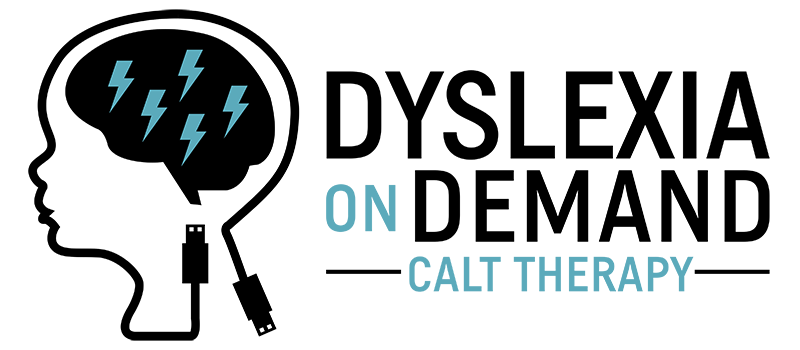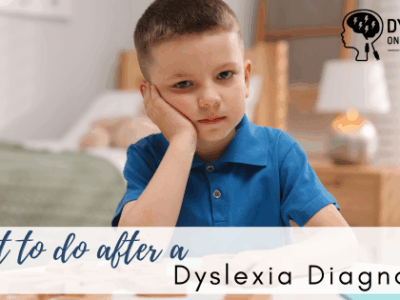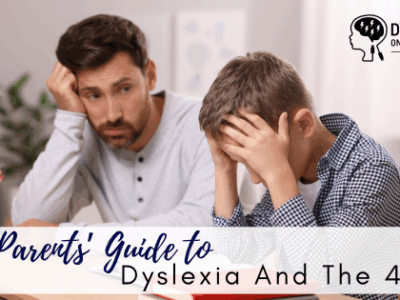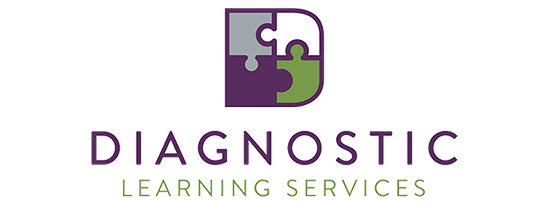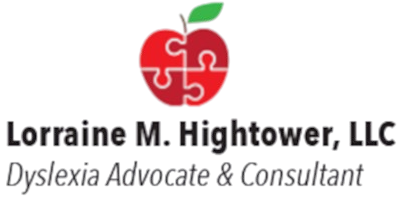The Five W’s of Dyslexia Assessment

The five Ws of dyslexia testing start with this fact: Dyslexia affects as many as one in five bright and motivated students who have average or above average intelligence. Adult literacy problems are also common, affecting one in four who are intelligent but have not been able to attain a functional literacy level. This can be crippling to self-image and mental health. Also, it plagues our workforce, and is directly linked to high percentages of our prison population. Assessment is the first step in identifying these students early to make sure they receive the effective instruction they need to succeed.
WHAT are we looking for?
The key symptoms of dyslexia are problems with reading and decoding, or single word reading, and/or poor reading fluency, and poor spelling. Phonological weaknesses or disorders, specifically language-based difficulties, are usually the underlying cause of literacy problems associated with dyslexia. Dyslexia is language based, not visual or related to cognitive skills or intelligence. Phonological processing problems are the principal cause of dyslexia. This refers to the ability to analyze speech or spoken language — from identifying individual words, to parts of syllables, and then into the smallest parts called phonemes. Some dyslexics experience problems with Rapid Automatic Naming that can compound reading challenges.
While the combination of official norm or criterion-referenced dyslexia testing batteries used for assessment will vary based on the assessor, the following specific areas should all be tested, based on what is age-appropriate for the child. Many states will also require cognitive testing to rule out an intellectual disability.
- Phonological Awareness
- Phonological or Language Based Memory (Verbal Comprehension)
- Rapid Automatic Naming
- Receptive Vocabulary
- Phonics Skills
- Decoding of Real and Nonsense Words
- Oral Reading Fluency: Single Words, Sentences, Paragraphs
- Spelling of Real and Nonsense Words
- Writing on Sentence Level and/or Paragraph Level
WHO will complete the testing?
We are not dyslexia testing professionals…. We leave that up to the incredibly talented neuropsychologists, psychologists, LSSPs and Educational Diagnosticians out there. That being said, I have been around the block in the dyslexia world a few times, so I wanted to share what I DO know from my own personal and professional point of view.
Let us start with the levels of assessors. When trying to determine the path to choose, I often ask parents to think about the questions that they are trying to answer. There is a reason for all the levels of testing professionals, but the one you choose may have more to do with the dyslexia answers you are seeking about your child. Also, I am speaking from the perspective as a Texas resident. Some states may place more broad abilities on our testing professionals.
We will begin with the full meal deal: the neuropsychologist. This guy or gal is the highest caliber of diagnostic you can secure when testing for dyslexia. After all, they are brain doctors. If you are concerned about the brain and motor functions of the child, you want to choose this option. They have the “global perspective” of what is happening in your kiddo’s brain and will apply that knowledge evenly.
The neuropsychologist will be looking at brain’s processing and functioning as it applies to dyslexia. They, of course, would be most folk’s primo and first choice, but not everyone has a spare $3–5K sitting around or the most stellar insurance, so we tend to shoot a little lower. For the record, these guys CAN diagnose ADHD which can be a key critical piece of information as it applies to the full child. The downfall? Often neuropsychologists and psychologists will hire psychometricians to do the testing and the psyches will just review the reports. If I were the parent paying for this report, I would want the same person who completed the testing to write the report. Make sure to ask about this if you go this route.
The next level of testing professional, and most likely one you will be using through the public school system, is the Licensed Specialist in School Psychology (LSSP). They use clinical testing (i.e. cognitive and academic testing) and collaborate with teachers and school staff in order to have the best picture of the whole student. These guys do not HAVE to work in the schools, but this is where you will typically find them. They are your next best bet, and OFTEN the free version of what is available to parents when testing for Specific Learning Disabilities such as dyslexia under the Individuals with Disabilities Act (IDEA) or 504 law.
They are also qualified to officially diagnose ADHD, although many states will not allow them to qualify students for the Other Health Impaired (OHI) label. Just for the record, psychologists do the same thing as LSSPs, but they just work in clinical versus school setting.
Now for Educational Diagnosticians. An Educational Diagnostician is a type of special education teacher who assesses, diagnoses, and works with students suspected of learning problems. They are the least qualified to diagnose dyslexia and have a limited battery of tests they can utilize in the process. The main difference between an LSSP and an Educational Diagnostician is the fact that LSSPs can test for disabilities that fall into the behavioral range like their emotional functioning and an Educational Diagnostician cannot.
In our state, they are required to have taught for at least two years and are utilized in many districts as assessors in partnership with LSSPs. Both LSSPs and Educational Diagnosticians are school-focused, with their primary job being to help children assess and understand when they are having academic and behavioral difficulties that are impacting them in a school setting.
Please note that if EVER you disagree with the results of an evaluation performed by an LSSP or an Educational Diagnostician through the public school system to qualify or continue in Special Education, you have the right under federal law to receive a neutral, third party/private evaluation. That is a completely different topic, but especially important to note for parents. For your reference, this is called an Independent Educational Evaluation (IEE). Throw that acronym around in an ARD meeting and the committee will be impressed!
WHERE will I go for the testing?
Regardless of the state you live in, both free and paid options for testing exist. Under the Individuals with Disabilities Act (IDEA), every parent concerned about a suspected disability has the right to receive an official assessment for FREE through the public school system. This also applies to all private school and homeschool students who don’t attend their local public “home school” thanks to your hard-working tax dollars.
Just so that you are aware, it CAN BE common to receive push back from the schools with answers such as: “we do not diagnose dyslexia – that is a medical issue, we cannot complete an evaluation until your child has completed our intervention attempts, and we do not need to complete an evaluation for Special Ed since all your child needs is a 504 plan for accommodations.” If you receive any of these answers, find an advocate or legal counsel.
Alternatively, some parents prefer to secure a more large-scale assessment through a neuropsychologist in their area. This can be another option for those with great insurance and/or the financial means to do so. The cost of this testing often ranges from $3–5K based on the state you live in.
Although dyslexia testing completed by the school LSSP and a neurologist are appropriate for documentation and admission into Special Education, if you attend your public home school, I suggest you double check with your school ahead of time to ensure that they will accept the neuropsychologist report, and this will not trigger completion of their OWN, additional testing. No kid needs to sit through both!
WHEN is the best time to do dyslexia testing?
One of the most commonly asked questions I get is “what age can you test for dyslexia.” Research demonstrates that direct instruction, provided appropriately, beginning kindergarten through third grade, can help even the most severely dyslexic-impaired students to catch up to grade level literacy skills and close the gap for most poor readers.
Early intervention of dyslexia is ideal. You can turn around a speed boat quickly, but a tugboat takes longer to turn around. The longer before we identify, the longer that child relies on their “masking” skills and the greater the impact on the child’s self-concept and social-emotional growth. Dyslexia CAN be remediated NO MATTER the age, but we are talking pie in the sky. Just because we don’t catch it early does NOT mean that intervention isn’t going to prove hugely impactful or successful. We have tons of students up through high school age who are finally finding the reading and spelling success they never previously had been able to access.
In a perfect world, we would test a student right when they turn seven years old for free through the school system, if we have a mild case of dyslexia. Then they would receive dyslexia therapy through the school and be complete in two years — never the better or wiser. For kids with more severe dyslexia, in the ideal world, we recognize symptoms super early on, or even had concerns due to a family history, triggering an early diagnosis through a neuropsychologist around age five and a half. Then they complete the pre-cursor therapy program such as Pre-Flight or Take Flight, and then continue to Take Flight, and are done by mid-elementary school.
Please be aware that through the school system, OFTEN, they are going to request their staff complete some level of Response to Intervention (RTI). Federal law states that eligibility for any Specific Learning Disability must consider a student’s past reaction to a multi-tiered support already provided. If you feel that your child has already been struggling, has already had adequate exposure to educational opportunity and your foundational concern for a reading disability is not COMPLETELY from left field, go with your mama or daddy gut and request the Full Individual Evaluation through the school.
Keep in mind that often, when we allow the school their opportunity to document their attempt at RTI, we lose precious time that we could have invested in “turning that boat around.” In theory, they should have already had a foundational concern through early screeners or poor academic progress — and come directly to YOU with concerns.
WHY do we want to secure a diagnosis?
I am often asked why dyslexia testing and diagnosis is needed. My answer varies depending on who I am speaking to and what state they are located in. The commonality amongst these individuals is my response. They all want to ensure that their child has the ability to access proper dyslexia accommodations to assist in their success at schools. These accommodations, when administered properly and regularly, simply level the educational playing field for your child. Even if the student is homeschooled or in a private school where adherence to accommodations is not mandated, with time the student will want access to them since they are recognized through the college level. But accommodations can ONLY be accessed with the proper documentation.
Also, many folks I speak to reside in states that do not have legislation ensuring appropriate dyslexia intervention in the schools. This leaves them in the hands of the special education staff to provide reading support. Of course, these are dedicated professionals who do an amazing job, and I am a HUGE advocate of these hard working folks. After all, I was one for too many years to count. That said, these folks are generalists in ALL disabilities and don’t have the intricate training or education that is needed to instruct your dyslexic child in the manner their brain requires. They can give them more individualized support and ensure their accommodations are being executed by the general education teacher, but they aren’t equipped to deliver the explicit, systematic, multisensory reading and spelling instruction your child with dyslexia requires.
Some states have intervention requirements, which typically just means that they are required to provide some level of evidence-based dyslexia intervention. But even the most progressive states are not at the point that the legislation specifically designated the services must be provided by a Certified Academic Language Therapist (CALT). For the record, some public schools in Texas and Arkansas have CALTs on select campuses in metro areas to service the kids for free as part of their school day. Those parents don’t even know how lucky they are when we look at the status of the rest of the country!!
What’s my point? Get your child proper dyslexia therapy which is much more than dyslexia tutoring — regardless of whether it is with Dyslexia On Demand or a local Certified Academic Language Therapist (CALT) of your choice. Don’t cross your fingers and rely on the school to give your child complete dyslexia testing and educational intervention. And if your mama or daddy gut tells you that your kid has dyslexia, trust it. Don’t wait to go through the entire testing process to find out what you already know. MOST schools will NOT give you what your kiddo needs, so secure the dyslexia intervention FIRST and then pursue the diagnosis for the accommodations.
Citation: International Dyslexia Association https://dyslexiaida.org/dyslexia-assessment-what-is-it-and-how-can-it-help-2/
This blog is a collaboration between Megan Pinchback, MBA, CALT, LDT, Owner of Dyslexia On Demand, and Kate Curran Mire, SSP, LSSP, NCSP, Co-founder of Hill Country School Psychology Services, Parent Educator at Ensemble Therapy
